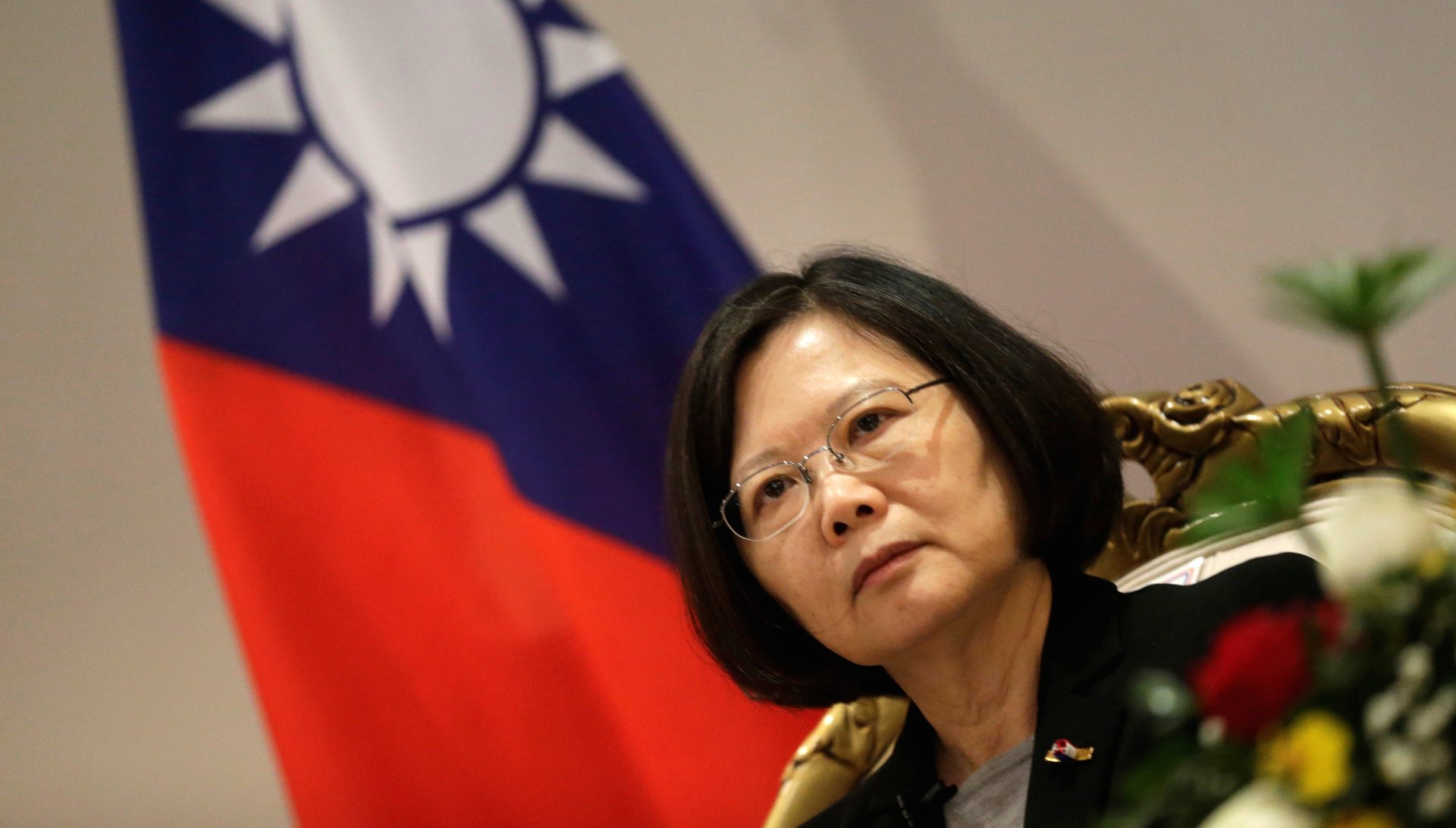The US is treating Taiwan like its secret side piece
In the past week, the Asia Pacific nation of Taiwan had its fifteen minutes of fame with American audiences. It was not due to the fact that Taiwan is on the cusp of legalizing same-sex marriage—the first in Asia if if does happen—but due to a simple phone call between its president Tsai Ing-wen and US President-elect Donald Trump.


In the past week, the Asia Pacific nation of Taiwan had its fifteen minutes of fame with American audiences. It was not due to the fact that Taiwan is on the cusp of legalizing same-sex marriage—the first in Asia if if does happen—but due to a simple phone call between its president Tsai Ing-wen and US President-elect Donald Trump.
The call, in which Trump speaks directly to a leader of Taiwan, ignores precedent set by previous US administrations that treats Taiwan as a pariah in an attempt to secure relations with the People’s Republic of China. Since the US cut off official diplomatic relations with Taiwan in 1979, US presidents (or presidents-elect) have not directly spoken to the presidents of Taiwan.
Donald Trump’s politics, values, and temperament are profoundly troubling on everything from immigration, taxes, women, and not the least LGBT rights. Americans who subscribe to cosmopolitan liberal values are right to scrutinize Trump’s every word and action, with elevated skepticism.
But this heightened sense of caution has also caused American liberal progressive to condemn Trump for the phone call with Taiwan and painted the move as being detrimental to US-China relations. Moreover, Taiwan has been called “Trump’s new friend” as if the entire nation of Taiwan is necessarily bigoted like Trump.
What an ignorant disaster.
Taiwan is actually well on its way to becoming a liberal progressive’s dream come true. Taiwan elected its first female president, whom everyone was surely able to see from the barrage of media reports this past week. There is a mandated quota for women’s participation in politics. The youngest cabinet minister is put in charge of digital transparency, who also just happens to be transgender. Guns are illegal, and, as I mentioned, it is on its path towards legalizing marriage equality, with the biggest Pride Parade in Asia running for more than a decade now.
Not to mention, the Taiwanese remember well what it was like living under authoritarianism—it only transitioned from martial law to full electoral democracy in 1987. The Taiwanese did not do this with a military coup, but with decades-long impassioned civil disobedience and well thought-out negotiated constitutional reforms.
Despite aspiring to all the same liberal values, the United States has relegated Taiwan to an “unofficial” relationship, one that while giving Taiwan all the practical benefits of a relationship, must not be called a relationship. To any LGBT individual, this sounds all too familiar.
In other words, Taiwan is stuck in a separate but equal civil union, not a marriage equal to everyone else.
Civil unions are problematic since it is essentially a way to formally allow same-sex couples to marry without using the word “marriage.” It is a compromise, a halfway solution. On the one side, the state tells us: “but you receive all of the actual benefits of marriage, you will be registered, you can even fight over custody and inheritance, just like the rest of us ‘normal’ heterosexual couples.” On the other side, the state appeases a darker master, the majority’s self sanctification and hatred towards the queer. Oh, and as part of the compromise, we are supposed to quietly enjoy our newly gifted benefits and shut up.
Taiwan finds itself in the exact same situation. Since 1979, the United States has continued its Taiwan policy based on the Taiwan Relations Act (TRA) and the “Six Assurances,” which are just the same kind of legal workarounds as civil unions are workarounds for marriage. The TRA stipulates US continuing unofficial ties with Taiwan as if they were official ties, and sets up offices which by all means are embassies, except they cannot be called embassies and are called the American Institute in Taiwan. Furthermore Taiwan is invited to participate in the international arena, but only as observers, or forced to use a fake name, such as “Chinese Taipei” in the Olympics.
All this is done to appease China, which clings on to a Cold War era territorial claim on Taiwan, and bullies foreign governments to agree not to recognize Taiwan as a sovereign state. The United States merely acknowledges the Chinese position, but effectively gives Taiwan all the benefits of a relationship while denying Taiwan the dignity of being treated like everyone else.
If there was ever a compromise, ever a halfway solution, as brilliant as this one. Some tout this as ingenious diplomacy. I call this discrimination.
The institution of marriage officially recognizes commitment between partners, and the weight of the institution gives gravity to the relationship. To put a selected group of our own friends, coworkers, neighbors and family into a separate category is discriminatory—even if the practical benefits are the same. What we want is not parallel benefits, but the dignity of being treated equally. The same goes for our friends who shares our values across the world.
Taiwan is gearing up today, as I write, for pro-marriage equality rallies all over the country (in Taipei, and in Taichung). Let us hope that Taiwan makes this momentous step. Let us also hope that we, as Americans, do not serve yet another dark master of bigotry, and seriously consider our diplomatic relationship with Taiwan.